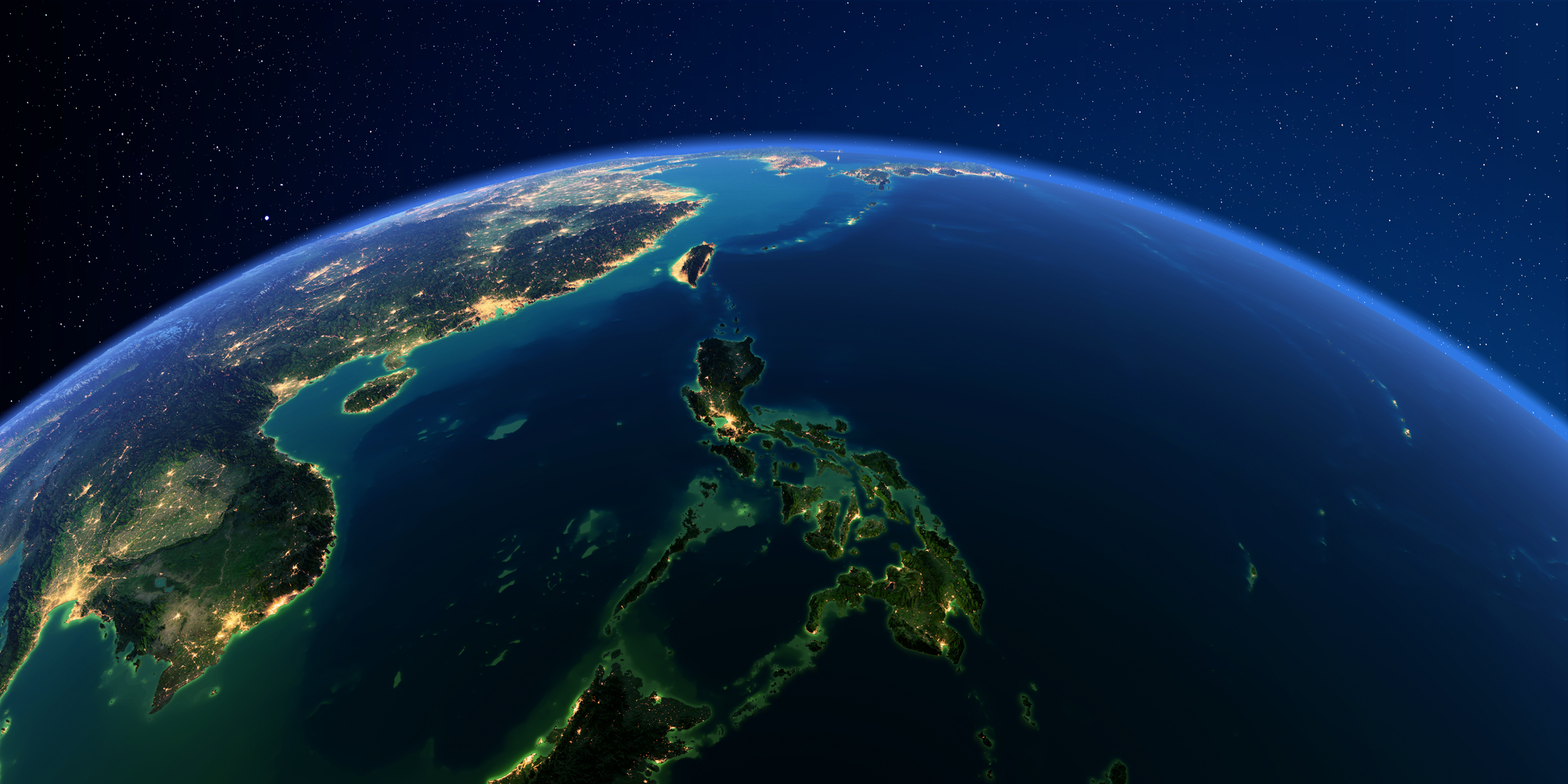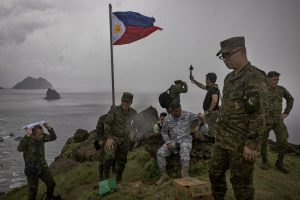The Philippines’ President Ferdinand Marcos Jr. took office in June 2022; since then, the specter of a cross-strait crisis has loomed large. One of the first regional foreign policy crises that Marcos had to address was the aftermath of then-U.S. House Speaker Nancy Pelosi’s visit to Taiwan that August.
At just about 160 kilometers from the Philippines’ northernmost province, Batanes, Taiwan is an even closer neighbor to the Philippines than China. In fact, the northernmost point of the Philippines, Y’ami Island, is closer to southern Taiwan than northern Luzon – demonstrating the importance of developing a new Taiwan policy for Manila.
The location of three out of the four new Enhanced Defense Cooperation Agreement (EDCA) sites in the northern Philippines – agreed to under the pivot back to the United States under Marcos – is a recognition of this crucial proximity. If conflict breaks out over Taiwan, then the Philippines will likely be involved, not just because of physical geography but also because the U.S. alliance will require some level of reciprocity.
Marcos himself has acknowledged such a likelihood. During his February 2023 visit to Tokyo, he stated, “When we look at the situation in the area, especially the tensions in the Taiwan Strait, we can see that just by our geographical location, should there in fact be conflict in that area … it’s very hard to imagine a scenario where the Philippines will not somehow get involved.”
Has that acknowledgment – and the possibility of conflict over Taiwan – resulted in substantive policy changes under Macros?
Unfortunately, the National Security Policy (NSP) 2023-2028 does not capture the importance and complexity of the Taiwan issue and its implications for Philippine national security. The document raises the economic and humanitarian impact that a conflict could have on the Philippines, but the five-year policy downplays the fact that the Taiwan issue, above all, is a security and defense concern that may be more catastrophic than the West Philippine Sea/South China Sea issue. Such a policy calibration is critical and necessary for Manila to effectively prepare for, or even deter, a Taiwan conflict.
The 2023-2038 National Security Policy
The Philippines has only ever promulgated three National Security Policy documents, which are intended to reflect the visions and ambitions of Philippine foreign policy toward national security for the country’s leader. A review of the three NSPs published since 2011 would suggest how the Philippines views its national security environment and the impact that global forces have, if any, on the Philippines. The inaugural NSP, which was produced during the administration of late former President Benigno Aquino III, made no mention of Taiwan. It was not until the NSP 2017-2022, promulgated by former President Rodrigo Duterte, that the China-Taiwan conflict was first identified as a flashpoint of immediate concern.
The NSP 2023-2028 has maintained this status, not only citing cross-strait relations as a potential flashpoint in the region, but also flagging it as a risk that could jeopardize the Philippines’ economic stability and trigger a humanitarian crisis with the anticipated influx of refugees, and impact on overseas Filipino workers. The policy stated:
Major concern is also seen in the Cross-Straits relations that has the potential to be the flashpoint in the region. The Philippines is concerned about its economic stability, a potential influx of refugees, and the welfare of overseas populations. Any military conflict in the Taiwan Strait would inevitably affect the Philippines given the geographic proximity of Taiwan to the Philippine archipelago and the presence of over 150,000 Filipinos in Taiwan.
The placement of the Taiwan issue in the document, second only to security issues in the West Philippine Sea, would appear to demonstrate that Manila recognizes the possible threat of a Taiwan conflict. However, the NSP 2023-2028 does not fully appreciate that a conflict over Taiwan poses a defense and security concern for the Philippines that may eventually eclipse in importance the West Philippine Sea/South China Sea issue.
This calls for a paradigm shift in the Philippine government’s approach. Manila needs to navigate the risks that come with a possible Chinese conquest of Taiwan, and the implications of Taiwan gaining full independence, keeping in mind its interests in the South China Sea. A Chinese-annexed Taiwan would result in Beijing controlling the two largest naturally occurring islands in the South China Sea: Pratas/Dongsha Island and Itu Aba/Taiping Island, the latter of which the Philippines claims. Both are currently under Taiwan’s control.

This satellite image shows the Philippines, Taiwan, along with mainland China and Southeast Asia. Image via Depositphotos.
Why Taiwan Is Important for Manila
The conduct of military drills near Taiwan in August 2022, as well as regular Chinese naval through the Bashi Channel and Luzon Strait, and the recent launch of a ten-dash line “standard” map that counts Philippine territory as a part of China’s pinpoint the need for Manila to more seriously consider Taiwan and the prospect for conflict primarily a security issue than a humanitarian or economic one. This growing threat gives rise to a need for a policy that clearly defines the Philippines’ national interests, which is vital in determining the length to which the country should go in helping to protect Taiwan.
An invasion of Taiwan would strengthen China’s power projection in the region and weaken the United States’ influence and ability to support allies. It would also be a “disaster” for the Philippines with regards to its claims over the West Philippine Sea, as the U.S. has limited munitions, which could drive it to cede the South China Sea.
Taiwan also serves as a buffer zone. Losing Taiwan to China would give Beijing access to the Luzon Strait, particularly the Bashi Channel that separates Taiwan and the Philippines. The Bashi Channel is strategically significant because the waterway is the entry point into the Pacific Ocean and out of the South China Sea. It is also a major maritime trade route and where submarine communications cables pass through to connect the United States, Japan, and South Asia.
These waterways would be critical points for either side to control in a conflict: China would use the waterways to blockade southern Taiwan and prevent the Philippines from being a major factor in the conflict, while the United States would use the waterway to shuffle refugees out of southern Taiwan and to move troops into the country.
Having access to the Bashi Channel would allow China to move beyond the “first island chain,” consisting of Japan, Taiwan, the Philippines, and Indonesia. It would also pave the way for China to monitor and limit the access of other states to the waterway. The People’s Liberation Army Navy (PLAN) already uses the waterways as a transit route to the Western Pacific, where it carries out military exercises.
A Taiwan conflict means not just a war in the Taiwan Strait. It also means a war in the Philippines – not just because of its proximity but also due to the country’s alliance with the United States.
Under U.S. President Joe Biden, the United States has maintained close military relations with Taiwan, even as it remains firm in adhering to its “One China” policy. Just last July, the U.S. government announced a record $345 million military aid package for Taiwan, in addition to the sale of military equipment, worth $440 million. The United States has also opted to allocate $80 million to Taiwan, out of a potential $2 billion Foreign Military Financing program, granted to assist sovereign and independent states. This was the first time that Washington has utilized this program for Taiwan.
While the U.S. has taken strides in strengthening Taiwan’s defense capabilities, it no longer maintains a military base in Taiwan. The U.S. military presence ended in 1979 after Washington severed its official diplomatic relationship with Taipei in favor of Beijing.
This is where the Philippines comes in. Under EDCA, the Philippine government has now granted the U.S. access to nine military bases, three of which are in the north. While the Marcos government has claimed that the new EDCA sites were purely “defensive,” there is no guarantee that the bases will not be brought into play in the event that tensions in the Taiwan Strait escalate into warfare. And in this scenario, it would be strategic for China to attack these bases to cripple U.S. assets and personnel in the Philippines – and to send a message to Manila to remain neutral lest it risk additional strikes on the country.
In describing the Taiwan issue as primarily an economic and humanitarian crisis, the NSP overlooks that the Philippines forms part of the United States’ defense ecosystem in the region, making it a potential target of China – a serious risk that should have been reflected in the policy. This would also be useful in determining the extent to which the Philippine government should help in protecting Taiwan, even though Taipei rejected the 2016 international arbitration decision that ruled in favor of the Philippines in regard to China’s nine-dash line in the South China Sea.
An independent Taiwan presents a fair share of consequences to the Philippines, considering both states have their respective claims in the South China Sea. Taiwan in particular rejected the arbitral tribunal’s ruling denying “island” status to any of the features in the Spratly Islands – including Itu Aba (Taiping) Island, the sole outpost of Taiwan in the disputed sea. The decision eliminates the possibility of claiming a 200-nautical-mile exclusive economic zone around Itu Aba. Taiwan rejects that classification and “staunchly defends Taiping Island’s status as an island… as well as corresponding maritime entitlements accorded by UNCLOS.”
While Taipei and Manila have significant differences in sovereignty and claims in the South China Sea, the two countries have intersecting interests when it comes to cross-strait stability. An expansion of Chinese military power over Taiwan would have grave implications for the Philippines. The NSP 2023-2028 already recognizes that a military conflict in the Taiwan Strait would “inevitably” affect the Philippines, but it fell short of securitizing the issue. Moving forward, the Marcos administration should recalibrate how it considers the security dimension of a Taiwan conflict.

































